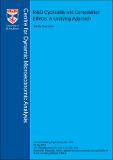R&D cyclicality and composition effects : a unifying approach
Abstract
Existing empirical studies do not concur on whether R&D spending is procyclical or countercyclical: the former hypothesis is supported by studies of aggregate R&D spending, whereas the latter is vindicated by firm-level evidence. In this paper, we reconcile the two facts by advancing a general equilibrium framework, in which, while a single firm's R&D spending profile is countercyclical, aggregate R&D spending is procyclical owing to procyclical fluctuations in the number of R&D performers. Our findings suggest that economic crises might be beneficial for economic performance by fostering individual R&D effort. An advantage of our framework is that it brings together conflicting pieces of empirical evidence, while incorporating and building upon Schumpeter's hypothesis of countercyclical innovation.
Citation
Chernyshev , N 2017 ' R &D cyclicality and composition effects : a unifying approach ' CDMA Working Paper , no. 1705 .
Type
Working or discussion paper
Collections
Items in the St Andrews Research Repository are protected by copyright, with all rights reserved, unless otherwise indicated.

